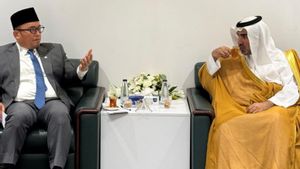JAKARTA - Economist from the Institute for Development of Economics and Finance (Indef) Nailul Huda said the solution to survive the global economic storm is to maintain people's purchasing power. This is because Indonesia's economy is more supported by domestic consumption.
Furthermore, Nailul said that so far, the government's strategy is right in responding to global turmoil by maintaining price stability and providing social assistance (bansos) to the community.
"So, the solution is to maintain people's purchasing power. In addition, because our GDP is 50 percent of household consumption, it's very natural, we focus on it and support the government's focus on that," he said, in Jakarta, Friday, October 7.
For your information, the government has provided three types of additional social cushions with a total budget of Rp. 24.17 trillion. However, Nailul emphasized the importance of taking sides in social assistance funds in the coming year.
Nailul said this was because the challenges of the global economy were predicted to be even more difficult in the future. "It must also be balanced with the allocation of social assistance in the upcoming 2023 State Budget," he said.
Nailul emphasized that the government's strategy of providing social assistance will be very useful in maintaining people's purchasing power next year.
"Well, this social assistance can be an instrument to maintain the purchasing power of people in need. At least, from within the country must be strengthened first," he said.
Not only that, Nailul also suggested that there be a budget reallocation for the benefit of social assistance. This could be a diversion from the defense budget.
"There must be a reallocation of the budget from defense to social affairs. This defense has quite a lot of budget next year. Yes, it should be allocated to social assistance," he concluded.
Healthy Fiscal
Meanwhile, Bank Mandiri Economist Faisal Rachman said there are two things that the government needs to maintain. First inflation and the risk of a global recession against the trade balance.
"Inflation that must be maintained so that it does not rise high because it can influence domestic consumption that supports growth. If commodity prices drop, the surplus will shrink and this becomes the pressure for the exchange rate," explained Faisal.
Meanwhile, the Executive Director of CORE Muhammad Faisal appreciated the work of the Ministry of Finance to maintain fiscal conditions. Fiscal conditions are much healthier, one of which is because the windfall profit that affects fiscal health, until now it has even been a surplus.
However, next year's challenges, the Ministry of Finance will consolidate fiscally to reduce the fiscal deficit to below 3 percent. Meanwhile, it is predicted that the commodity windfall will begin to decrease due to the global recession.
"In addition, there will be a wait and see action for investors because in the second half of 2023 there will be political year pressure for the 2024 election," said Faisal.
Previously, Coordinating Minister for Economic Affairs (Menko Ekon) Airlangga Hartarto revealed that the government had provided three types of additional social cushions with a total budget of Rp 24.17 trillion.
The three aids in question are Direct Cash Assistance (BLT), Wage Subsidy Assistance (BSU), and the use of 2 percent of General Transfer Funds (DTU) by the Regional Government.
"The provision of these social pads is expected to protect people's purchasing power from the pressure of global price increases and also reduce poverty in Indonesia. In addition, we continue to monitor the movement of food commodity prices so that they can immediately anticipate if there is a price spike, and maintain supply chains, especially food commodities," said Airlangga.
The English, Chinese, Japanese, Arabic, and French versions are automatically generated by the AI. So there may still be inaccuracies in translating, please always see Indonesian as our main language. (system supported by DigitalSiber.id)












